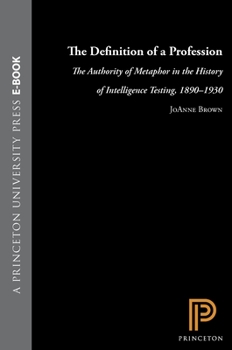The Definition of a Profession: The Authority of Metaphor in the History of Intelligence Testing, 1890-1930
In the early twentieth century, a small group of psychologists built a profession upon the new social technology of intelligence testing. They imagined the human mind as quantifiable, defining their new enterprise through analogies to the better established scientific professions of medicine and engineering. Offering a fresh interpretation of this controversial movement, JoAnne Brown reveals how this group created their professional sphere by semantically linking it to historical systems of cultural authority. She maintains that at the same time psychologists participated in a form of Progressivism, which she defines as a political culture founded on the technical exploitation of human intelligence as a "new" natural resource. This book addresses the early days of the mental testing enterprise, including its introduction into the educational system. Moreover, it examines the processes of social change that construct, and are constructed by, shared and contested cultural vocabularies. Brown argues that language is an integral part of social and political experience, and its forms and uses can be specified historically. The historical and theoretical implications will interest scholars in the fields of history, politics, psychology, sociology of knowledge, history and philosophy of social science, and sociolinguistics.
Format:Hardcover
Language:English
ISBN:069108632X
ISBN13:9780691086323
Release Date:August 1992
Publisher:Princeton University Press
Length:228 Pages
Weight:1.15 lbs.
Dimensions:0.8" x 6.4" x 9.6"
Customer Reviews
0 rating





